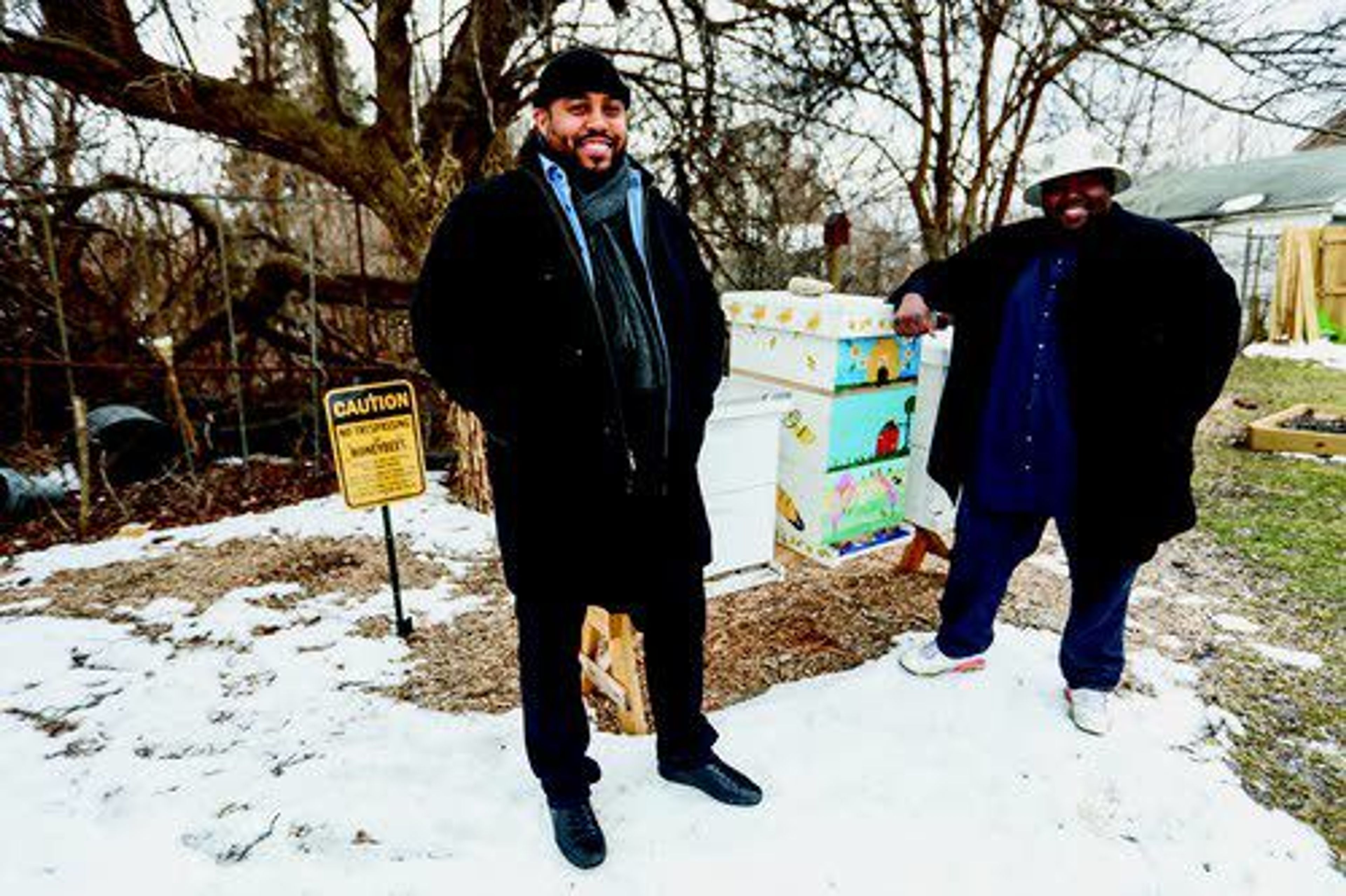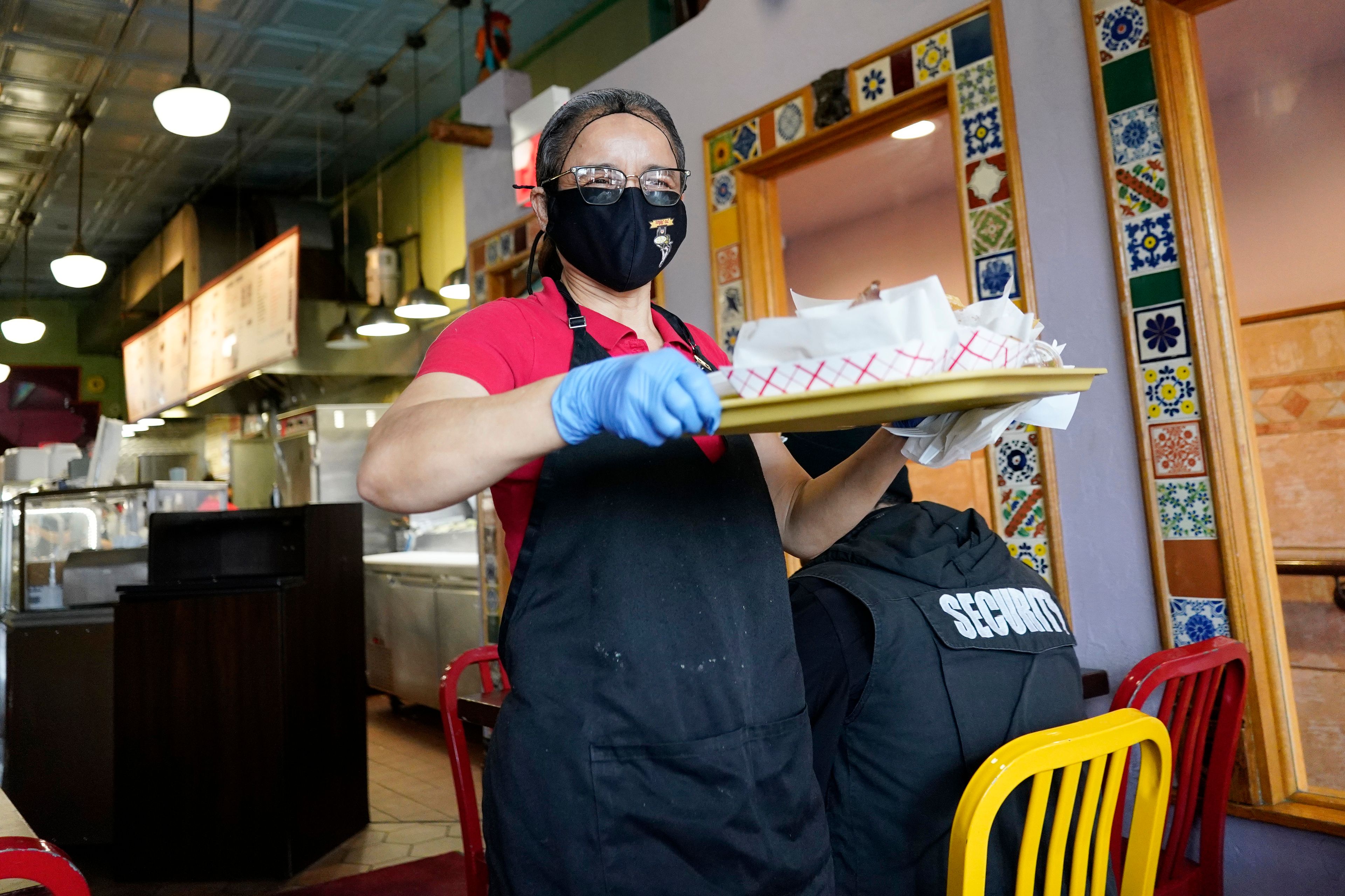Backyard beekeepers: Saving the world one hive at a time
Timothy Paule started a nonprofit to build beehives on vacant city plots
DETROIT - For the past few years, national media have touted Detroit's comeback story: It endured dark days, went through the nation's largest municipal bankruptcy, and is - literally, with the construction of a new skyscraper - on the rise.
The city is about to face a different kind of buzz.
"We're starting to see more bees in the city," said Timothy Paule, who, with his girlfriend, started a nonprofit to build beehives on vacant city plots. "Some people are planting urban farms, and they're adding bees to help with the yield. Others are doing their part and placing hives in backyards to help the declining bee population."
As the weather warms up, their bees - and millions of others - will get busy.
Paule is among a growing number of people in Detroit and around the globe who are cultivating urban beehives as part of social missions and small businesses. It is a trend that has prompted cities to lift beekeeping limitations and inspired entrepreneurs to sell beekeeping starter kits and the bees' honey.
But to Paule, there's a bigger benefit: saving bees, which, to him, means saving the world.
The Detroiter hopes to add as many as 200 hives in the city in the next decade through his nonprofit, Detroit Hives, by buying vacant Detroit lots, making deals with socially conscious companies to sponsor hives and teaching other people, including schoolchildren, about bees.
"If all bees were to die, we'd all die in four to five years," Paule, 34, said. "It's a very serious issue."
Whether all life would be wiped out if bees became extinct is debatable, but there is scientific agreement that bees, which have seen declines in their population all over the planet, are essential to sustaining a healthy ecosystem.
Without bees, which transfer pollen and seeds from flower to flower, fruit quality suffers.
In Michigan alone - which has designated March as food and agriculture month to remind folks that the state is one of the most agriculturally diverse in the nation with 300-plus farm commodities - agriculture contributes more than $101 billion to Michigan's economy.
In fact, every spring and summer, Michigan's farmers rent bees by the truckload - because there aren't enough bees to do so naturally - to make sure that their apple, peach, blueberry and cherry blossoms are properly pollinated.
"Bees play a very important role during our bloom period in pollinating all the blossoms," said Kevin Robson, horticulture specialists with the Michigan Farm Bureau in Lansing. "And, it's not just fruit, they also pollinate cucumbers and zucchini and squash and tomatoes - and everything with a blossom."
Bees and the city
But beekeeping in metro areas is a newer idea.
In Paris, the City of Lights, bees are now buzzing on rooftops, balconies and in public gardens. Bees have found homes in Berlin, London, Tokyo, Hong Kong, Sydney, Vancouver, British Columbia; Toronto, Chicago, Milwaukee, Denver and New York.
Small-scale beekeeping is especially popular among people who want food from local sources.
Local restaurants and distilleries buy the honey to add to dishes and cocktails.
And sellers of live bees and home beekeeping equipment, such as Great Lakes Bee Supply in Galesburg, say that the urban beekeeping trend has helped their businesses to skyrocket every year for the past five years.
"The amount of people doing backyard beekeeping where they allow them has gone up a lot," said beekeeper Wrifton Graham, the owner of Great Lakes Bee Supply. "Every year, it's surprising just how many more people are getting into it."
Beehives became so popular in Denver, Milwaukee and New York that those cities - which previously had banned beekeeping, in part, because of folks were afraid of the stinging insect - lifted their restrictions. (New Yorkers are still required to register their hives.)
Michigan has some regulations and inspections of commercial hives, but, for the most part, it leaves regulation of smaller operations - hobbyists and residents with small side businesses - to municipalities.
There are no beekeeping ordinances in Detroit.
But city spokesman John Roach said the planning commission expects to draft some soon.
Bees are dying
Honey bees, the "workhorse of pollinators," came to America with the earliest settlers in the 1620s.
The bees populated the countryside and flourished. But, since the 1940s, bee populations have been on the decline, falling from about 6 million hives to about 2.5 million hives. Scientists attribute the drop to parasitic mites, climate change, pesticides and sickness.
In 2009, Michelle Obama did something that spurred urban - and suburban - beekeeping nationwide: She installed a hive at the White House. The hive made a statement about the importance of bees, and it supplied the first family with honey.
Six years later, the federal government came up with a national strategy to save bees. Over the next two years, it listed various species of bee, including the rusty patched bumblebee, on the federal endangered list to protect them.
"Pollinators are critical to our nation's economy, food security, and environmental health," the White House strategy said. The report credited honey bee pollination with annually adding $15 billion to crops. Bees, the report said, ensure "our diets are plentiful with fruits, nuts and vegetables."
This past summer, second lady Karen Pence, who in Indiana kept bees at the governor's mansion, put the new administration's stamp of approval on backyard beekeeping: She also added a beehive, this one at the vice president's residence.
Michigan - which, used to have strict bee regulations before the early 1990s - doesn't track urban and suburban beekeepers, who are known in the industry as apiarists.
Mike Hansen, the state apiarist who oversees commercial bee inspections, said unofficial estimates of the number of people in Michigan with beehives on rooftops and in backyards range from about 3,000 to 10,000.
Brian Peterson, who runs Bees in the D, has more than two dozen hives in metro Detroit, including two on top of the Detroit City Distillery in Eastern Market. The hives on the distillery produce honey that goes into the spirit-maker's drinks.
In North Street, an unincorporated area near Port Huron, Tim and Darla Volke started a beekeeping hive a few years ago. They later entered their bees' wildflower honey in a competition and won the top prize.
Paule, who works in advertising, said he started his bee operation after he had gotten sick with a bad cough and learned that honey might have some medicinal properties that could cure him. He tried the honey. It worked.
And then he started thinking about having his own hive.
He and his girlfriend, Nicole Lindsey, took classes to learn about bees. They bought a vacant plot on Detroit's east side for $340, and last year they bought a hive and bees. They now have two hives, one on the lot and another in a commercial parking lot also in Detroit.
Paule said his nonprofit has applied for grants and made deals with businesses, such as Grinstein Jewelry in Birmingham and Slows Bar Bq in Detroit, that want to support its work. Grinstein sells a bee-design necklace. Proceeds help support the bees. Slows will be using Detroit Hive honey in its sauces.
"It's a passion we are trying to develop," Paule said of his nonprofit and beekeeping. "We know things we are doing are beginning to have an impact on our community. Our mission is to spread awareness and support the conservation of honey bees."
'The right thing to do'
Paule makes the case that urban bees are exposed to fewer pesticides and herbicides, and they have a wider variety of plant life, wildflowers for instance, for pollination.
Still, research, also suggests too many urban hives might be bad for bees.
The Royal Society of Biology in London published a report in 2013 that found that urban areas might not have enough nectar and pollen for bees because so much of a city is concrete with manicured lawns.
This, it concluded, could lead to bee swarming, which could be dangerous.
Moreover, if urban hives are too close to factories, the bees can pick up contaminants.
French beekeepers near the town of Ribeauville noticed in 2012 that their bees were producing blue honey. When they traced the reason to its source, they found that the bees were picking up colored sugary waste from a nearby M&M candy plant.
Hansen, who has been inspecting bees in southwest Michigan for 30 years, said the overwhelming number of bees in the state - 90-95 percent - are managed by commercial beekeepers, but more and more people are starting their own beehives.
"It's fantastic if you can find a beekeeper that's been around a while to kind of mentor you," Hansen said. "The difficulty is so many people have gone into beekeeping in the last two years, the mentors are starting to say, 'I'm done with this!' "
Still, he said, beekeeping is a worthwhile hobby and enterprise.
"When a person makes a decision that they are going to step forward to get a colony of bees, it is a tremendous benefit to them and their neighbors," he said. "It helps gardens, wildflowers anything growing nearby."
The bees produce honey, and they make people feel good.
"The social impact of saying 'I'm doing something' also is very important to people," Hansen added. "There are people in the state keeping bees, paying people to help take care of bees, and the economics of beekeeping isn't even part of the conversation. They are doing it because it's the right thing to do."
TNS









